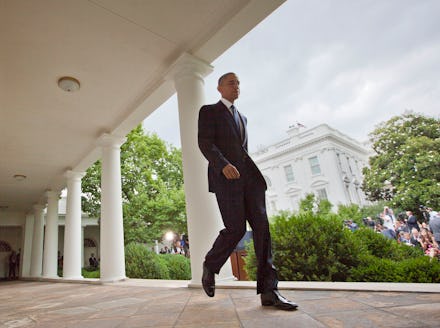President Obama Says Supreme Court Same-Sex Marriage Decision Makes "Us All More Free"

First, he called Jim Obergefell.
"I couldn't be prouder of you and your husband," President Barack Obama told the teary-eyed plaintiff after the Supreme Court struck down same-sex marriage bans, handing a decisive victory to LGBT activists and allies.
Next came a much larger audience. From the White House Rose Garden, Obama hailed the 5-4 vote, calling it "a vindication of the belief that ordinary people can do extraordinary things."
"Progress on this journey often comes in small increments, sometimes two steps forward, one step back," Obama said. "Sometimes, there are days like this — when that slow, steady effort is rewarded with justice that arrives like a thunderbolt."
Justice Anthony Kennedy's majority opinion arrived with a bang two hours earlier. Writing on behalf of his four more traditionally liberal colleagues, Kennedy delivered a compelling defense of the LGBT community and its fight for marriage equality.
"It would misunderstand these men and women to say they disrespect the idea of marriage. Their plea is that they do respect it, respect it so deeply that they seek to find its fulfillment for themselves. Their hope is not to be condemned to live in loneliness, excluded from one of civilization's oldest institutions. They ask for equal dignity in the eyes of the law," Kennedy wrote. "The Constitution grants them that right."
Obama himself only publicly came around to this line of thinking in May 2012, when he told ABC News' Robin Roberts, "[I]t is important for me to go ahead and affirm that I think same-sex couples should be able to get married." During his first presidential campaign and through most of his first term in office, Obama expressed support for "civil unions" and only in 2010 allowed he was "evolving" on the question.
On Friday, his support was clear and his language was triumphant.
"All people should be treated equally, regardless of who they are or who they love," Obama said, describing the decision as "a victory for gay and lesbian couples who have fought so long for their basic civil rights" and "for their children, whose families will now be recognized as equal to any other."
The candidates react: The Democrats hoping to take over the White House when Obama leaves in January 2017 were equally effusive.
"Along with millions of Americans, I am celebrating today's landmark victory for marriage equality, and the generations of advocates and activists who fought to make it possible," former Secretary of State Hillary Clinton said in a statement. Martin O'Malley, the governor of Maryland when it voted in 2012 to legalize same-sex nuptials, said the "Supreme Court affirmed that marriage is a human right — not a state right."
Sen. Bernie Sanders (I-Vt.) also celebrated the ruling, saying in his statement, "For far too long, our justice system has marginalized the gay community, and I am very glad the court has finally caught up to the American people."
The 16 members of the vast field of likely and declared Republican primary candidates were either silent or openly opposed to the decision. Former Florida Gov. Jeb Bush said he disagreed on personal, religious grounds.
"I believe the Supreme Court should have allowed the states to make this decision," Bush said in a statement. Another Floridian, Sen. Marco Rubio, also argued for the decision to be left to the states, accusing the court in his statement of "short-circuited the political process."
Wisconsin Gov. Scott Walker was more aggressive.
"The only alternative left is to support an amendment to the U.S. Constitution to reaffirm the ability of the states to continue to define marriage," Walker said in his statement.
The last word: But at the White House, Obama suggested this fight was over, and progress had prevailed.
"Today we can say, in no uncertain terms, that we made our union a little more perfect."